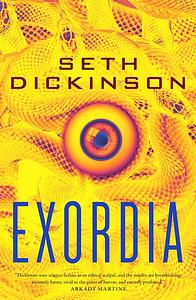Take a photo of a barcode or cover
adventurous
emotional
mysterious
reflective
tense
medium-paced
Plot or Character Driven:
A mix
Strong character development:
Yes
Loveable characters:
Yes
Diverse cast of characters:
Yes
Flaws of characters a main focus:
Yes
I came for the snake woman yuri and did NOT expect the polyamorous US army triad. In general this book could've done with more editing, because there is a far better book inside it just waiting to be polished, and that book had far less sluggish musings about the imperialist evils of realpolitik blah oh no are we the bad guys?? blah. However, every time I was tempted to DNF something truly batshit happened to keep me interested. Had a blast with the snake lady and Anna's mum. She IS the town drunk of the feminist commune and I love her for it
challenging
dark
emotional
informative
reflective
tense
medium-paced
Plot or Character Driven:
A mix
Strong character development:
Yes
Loveable characters:
Complicated
Diverse cast of characters:
Yes
Flaws of characters a main focus:
Yes
challenging
dark
inspiring
tense
slow-paced
Plot or Character Driven:
A mix
Strong character development:
Complicated
Loveable characters:
Yes
Diverse cast of characters:
Yes
Flaws of characters a main focus:
Yes
adventurous
challenging
dark
emotional
mysterious
sad
tense
medium-paced
Plot or Character Driven:
Character
Strong character development:
Complicated
Loveable characters:
Complicated
Diverse cast of characters:
Yes
Flaws of characters a main focus:
Yes
challenging
dark
emotional
mysterious
sad
tense
fast-paced
Plot or Character Driven:
A mix
Strong character development:
Yes
Loveable characters:
No
Diverse cast of characters:
Yes
Flaws of characters a main focus:
Yes
Most compelling trolley problem I've read. This is impressive, considering I don't find the trolley problem very compelling at all, actually.
Exordia has the exact blend of science fiction and metaphysical concepts that I could lap up in anything, so it's especially wonderful that they exist in a text that also gifts me with delicious prose. There's a few sections that could use some tightening up on word count, but that's just about the issue.
Note: Part of this book made me nauseous, which has not happened to me before in reading. If you're squeamish, I wouldn't skip this, but make sure you're ready when past the halfway point they start the mouse dissections.
Exordia has the exact blend of science fiction and metaphysical concepts that I could lap up in anything, so it's especially wonderful that they exist in a text that also gifts me with delicious prose. There's a few sections that could use some tightening up on word count, but that's just about the issue.
Note: Part of this book made me nauseous, which has not happened to me before in reading. If you're squeamish, I wouldn't skip this, but make sure you're ready when past the halfway point
Graphic: Animal death, Body horror, Genocide, Gore, Gun violence, Grief, Death of parent
adventurous
slow-paced
I sought out this book because I loved Dickinson's Baru trilogy, and despite the difference in genre, this proved an excellent move.
To summarize this book, I would say it feels like the author's twin goals were to teach people about the Gulf War and especially the Kurds who got caught in the middle, and to explore the sexual tension inherent in the trolley problem. Seth you icon.
This book was rather dense to get into, especially after part 1 where it falls back into a more circular method of storytelling fugue where the parts layer on top of one another to explain all of the different parts. However, if you can push through the initial learning curve and some of the sci-fi technicalities, it's really rich and interesting.
The problems are interesting, the characters are interesting, and Dickinson's storytelling, as always, is worth the effort to understand.
To summarize this book, I would say it feels like the author's twin goals were to teach people about the Gulf War and especially the Kurds who got caught in the middle, and to explore the sexual tension inherent in the trolley problem. Seth you icon.
This book was rather dense to get into, especially after part 1 where it falls back into a more circular method of storytelling fugue where the parts layer on top of one another to explain all of the different parts. However, if you can push through the initial learning curve and some of the sci-fi technicalities, it's really rich and interesting.
The problems are interesting, the characters are interesting, and Dickinson's storytelling, as always, is worth the effort to understand.
I haven't been this undecided about a rating in ages. The first act is excellent, one of the best things I've read recently, but it is a lie - it sets up a nebulous, symmetrical cloud of many possible stories, and the rest of the book collapses into a defined shape of one story. It is just not the one I was hoping for.
Or, to put it in more human terms: the first act is great and strange and quite abstract, told through the eyes of one strange woman, then the rest of the book is a play-by-play, hour-by-hour account of events that follow, from multiple perspectives. And I just didn't care for... not all of it, but some of it. I wished there were less military tactics and gambits, and more strangeness. I struggled through acts 2 and 3, even considered dropping the book at some points, as every time I started to care or be interested in some part of it, it would be torn away. Fortunately it picked up a lot in the last 2 acts. Still not what I hoped for, but gripping and imaginative.
Oh, and the body horror elements were excellently done. Language and descriptions in general, but that in particular.
So like... 6/5 for act 1, 3-ish for 2 and 3, then 4.5 for the finish. That's the best I can do.
Or, to put it in more human terms: the first act is great and strange and quite abstract, told through the eyes of one strange woman, then the rest of the book is a play-by-play, hour-by-hour account of events that follow, from multiple perspectives. And I just didn't care for... not all of it, but some of it. I wished there were less military tactics and gambits, and more strangeness. I struggled through acts 2 and 3, even considered dropping the book at some points, as every time I started to care or be interested in some part of it, it would be torn away. Fortunately it picked up a lot in the last 2 acts. Still not what I hoped for, but gripping and imaginative.
Oh, and the body horror elements were excellently done. Language and descriptions in general, but that in particular.
So like... 6/5 for act 1, 3-ish for 2 and 3, then 4.5 for the finish. That's the best I can do.
challenging
dark
funny
informative
slow-paced
Plot or Character Driven:
Plot
Strong character development:
Complicated
Loveable characters:
No
Diverse cast of characters:
Yes
Flaws of characters a main focus:
No
The synopsis for this is very misleading. I was under the impression that the book was going to follow the POV of the main character, Anna, and the alien for the whole book. But right after the first 40 pages the story turns into hard military scifi and we follow the POV of the most insufferable special forces military guy. It was so disappointing because I was really enjoying the dynamic between Anna and the alien, and the shift to the perspective of the US military was not the vibe, it's the last thing I want to read about. I flipped through the 500 page book to see if the POV goes back to Anna but it looks like we stick with this group of military people for the whole thing with Anna and the alien kind of in the background.
This dramatic shift left me to ponder why this decision was made. Now I can't help but infer that it felt like the white male author lost confidence telling this story about a Kurdish woman who is a war refugee and instead shifted to a white military guy with a heart of gold. Is this a fair assumption? Probably not, but I don't have a lot to go on and I don't have the patience to get through 500 pages of this story if this is the direction it's going to take. Anyone who has read this and can confirm that my assumptions are wrong, please feel free to correct me.
This dramatic shift left me to ponder why this decision was made. Now I can't help but infer that it felt like the white male author lost confidence telling this story about a Kurdish woman who is a war refugee and instead shifted to a white military guy with a heart of gold. Is this a fair assumption? Probably not, but I don't have a lot to go on and I don't have the patience to get through 500 pages of this story if this is the direction it's going to take. Anyone who has read this and can confirm that my assumptions are wrong, please feel free to correct me.






